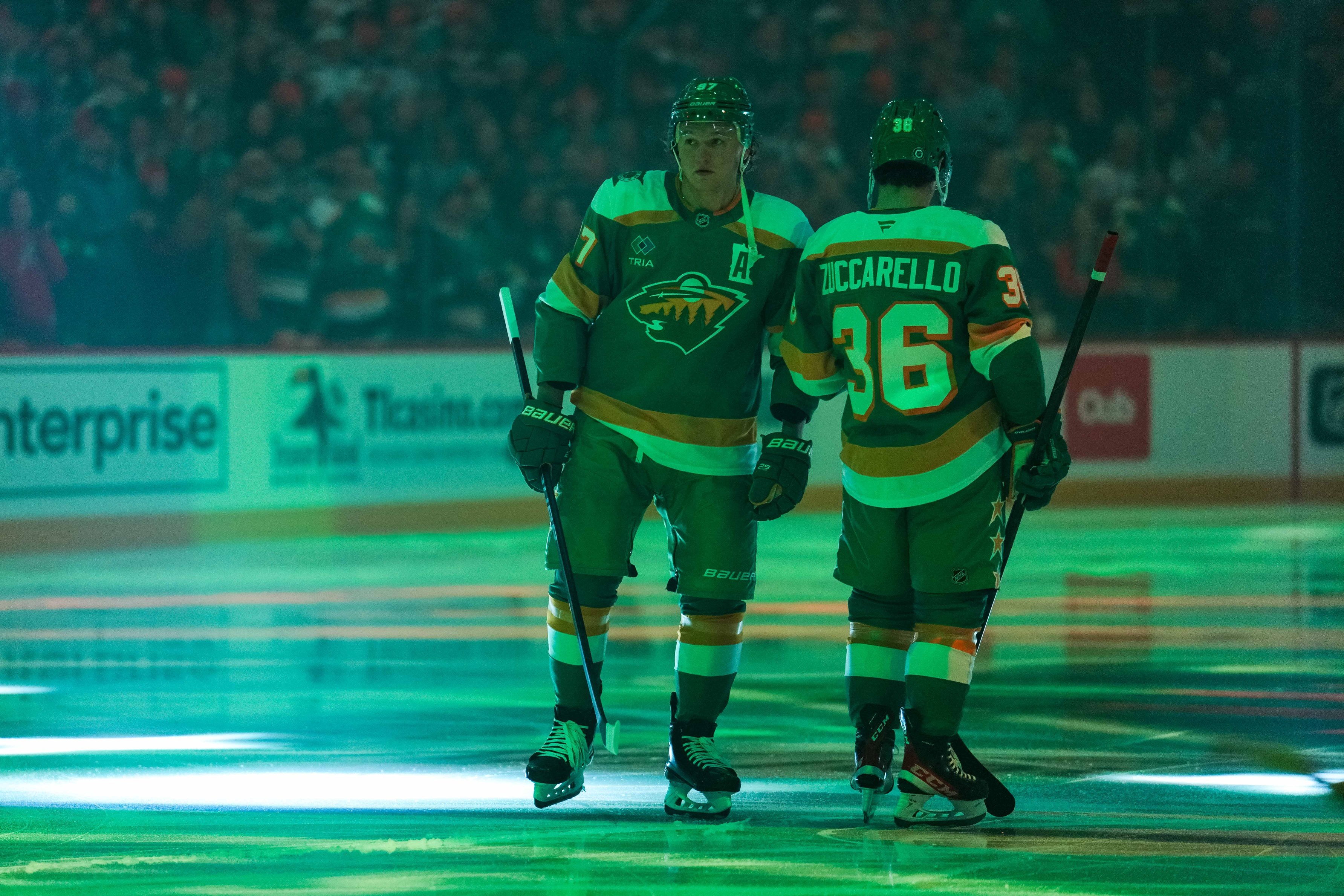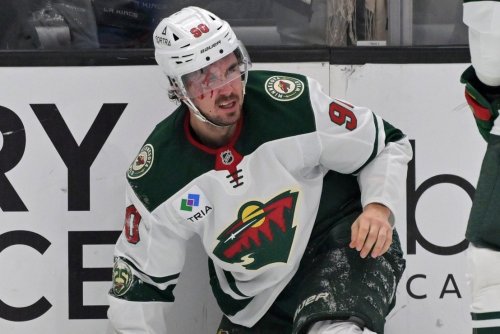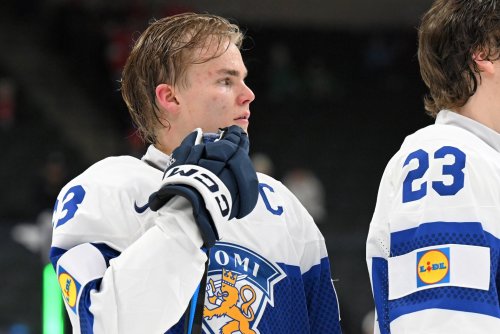
In 2012, the State of Hockey celebrated the Minnesota Wild signing two coveted free agents to 13-year, $98 million deals. Part of that celebration was understanding that by the time those deals wrapped up, Zach Parise and Ryan Suter would be in their 40s and not worth the $7.54 million cap hit.
Who cares? Minnesota collectively said. Let's deal with that when we get to it.
Those contracts wound up, predictably, becoming an albatross by the end. Was it worth it? Probably. But that's the thing with most long-term contracts to players approaching their 30s:
You will likely have the deal turn bad at some point.
Similarly, Wild fans are about to celebrate another long-term contract, this time for Kirill Kaprizov. After 185 goals and 386 points in 319 games during his first five years, Kaprizov's gonna have the closest thing to a blank check as we've seen in the NHL. If he wants eight years, $120 million, he's gonna get it. Heck, he might be able to get $16 million per year without the Wild blinking.
His age is the one area for hesitation. Kaprizov's no ordinary sixth-year player. If he arrived in his age-19 season, the Wild would be handing this deal to a 23-year-old, and that contract wouldn't expire until his age-31 season. Instead, Kaprizov debuted at 23, and he'll be getting a contract that (likely) will take him through his age-35 season.
Is it going to go badly at the end? It's not as slam-dunk a proposition as, say, Parise and Suter, but that threat is there. Even last year, you won't find a shortage of players who've gone on the decline as they entered their mid-30s.
Two-time Rocket Richard Trophy winner Steven Stamkos (34) had his worst season since his rookie year, with 27 goals and 53 points in 82 games. Former Hart Trophy winner Taylor Hall (age 33) had 18 goals and 42 points last season. Chris Kreider (33) went from scoring 39 goals and 79 points in 82 games to 22 and 30, respectively, in 68 games. Six-time 30-goal-scorer Vladimir Tarasenko (33) had just 11 goals and 33 points last season -- or in Wild terms, Marcus Johansson-type numbers.
But all Kaprizov needs to do to find hope that fate won't befall him is turn his head right.
That's where he'll see Mats Zuccarello, who just wrapped up his age-37 season.
Once upon a time, it looked like Zuccarello was headed for a mid-30s free-fall. He only scored 37 points in 65 games in his first year with the Minnesota Wild. Still, after forming his bond with Kaprizov the following year, he put any concerns to rest almost instantly.
At 34, 35, and 36, he scored 79, 67, and 63 points, more than he'd ever had in a single campaign beforehand. Even last season (54 points in 69 games) was impressive, especially considering he spent half the season without his wingman.
Sure, there's no doubt that Kaprizov drove that bus, but Zuccarello is the eighth-most productive player between ages 34 and 37 of the post-2004-05 lockout era. That's incredible, and you have to wonder why Zuccarello has aged so well.
The hypothesis is simple: Zuccarello's longevity is partly due to a lack of wear-and-tear that comes from being a late bloomer.
There are plenty of players who make the NHL by age 21. Zuccarello wasn't one of them. Instead, he made his SHL debut at 21, after dominating Norway's top league. Zuccarello finally made his NHL debut two years later, playing 42 games for the New York Rangers. He struggled to crack the NHL lineup the following season, and a lockout and injuries limited him to 15 games in 2012-13.
By the time he entered his age-26 season (where he finally played 77 games), Zuccarello had a grand total of 67 NHL games under his belt. That's insane, especially compared to some of the contemporaries we've listed as starting to fall off the cliff in their mid-30s. Here are those players' games played through age-25:
Stamkos: 569
Hall: 453
Tarasenko: 341
Kreider: 323
For a No. 1 overall pick like Stamkos or Hall, forget about it. They're gonna have hundreds of games more worth of wear and tear than Zuccarello did. But even Tarasenko and Kreider, who didn't debut until turning 21 and with the 2012-13 lockout depressing their early-career totals, had 150 to 200 games more miles on them than Zuccarello.
Kaprizov's not entirely at Zuccarello's extreme, but debuting at age-23 and having COVID shorten his rookie year have kept his games played totals down. He had just 203 games of experience through age-25, and even at 27, has fewer career games played than Tarasenko or Kreider had at 25.
We're not looking at a universal rule here. Alex Ovechkin logged more games through age-23 (324) than Kaprizov has through 27, and the dude just had 44 goals in 65 games. Meanwhile, someone like Jason Pominville had just 222 games of experience through age-25, but still saw his goal production decline hard in his mid-30s.
So, games played aren't everything, but Kaprizov has another quality that's helped Zuccarello age beautifully.
His playmaking skills.
Players not named Ovechkin tend to age out of having an elite shot. Beating the best goalies in the world requires elite reaction time and some extra oomph, to use a scientific term, when shooting the puck. Those two things fade as you get older.
Meanwhile, passing requires a much different skill set -- the vision to see plays develop and the ability to manipulate space being the primary ones. Sure, you have to get the puck from your stick to someone else's, but that requires a lot less top-tier physical gifts than beating a goalie one-on-one.
Kaprizov won't score 40 goals forever, but it's hard to see him losing his playmaking chops at 34. He's got an Old Man Skill to fall back on as his career goes on, and he's always been as crafty as he is talented.
Nothing is a slam-dunk when it comes to long-term contracts, but the players who age best tend to have a strong answer to the following question: What are you when you're not at your physical peak? Kaprizov's fastball is a 50-goal/100-point type MVP-caliber player. But if that slows down, you can bet he'll find a way to create offense.
He can play Zuccarello's game and has been similarly shielded from early-career wear-and-tear. Those parallels to his best friend are primed to keep him productive through whatever length of contract he'd sign in Minnesota.
Think you could write a story like this? Hockey Wilderness wants you to develop your voice, find an audience, and we'll pay you to do it. Just fill out this form.
-
 2
2
-
 1
1






Recommended Comments
Join the conversation
You can post now and register later. If you have an account, sign in now to post with your account.
Note: Your post will require moderator approval before it will be visible.